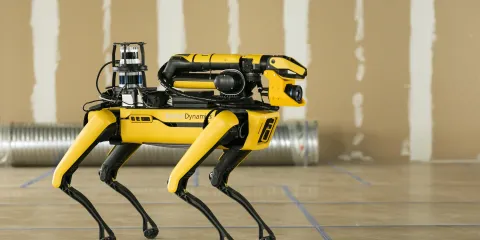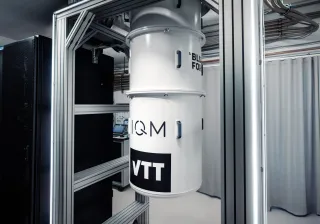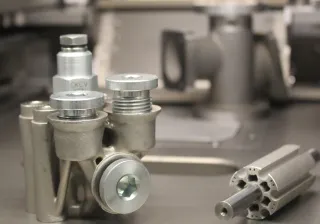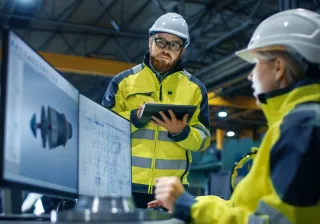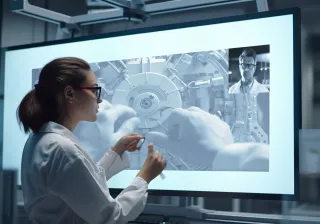Autonomous industry for safe, real-world operations

As industries push beyond traditional automation, the next frontier is systems that not only act, but understand. In autonomous industry, intelligence is brought to industrial processes and machines in a way that supports people, adapts to change and enhances safety in complex real environments.
Key facts
Science you can trust, results you can use: Applied research in AI, robotics, XR, human factors and safety turned into practical autonomy solutions you can build on, no need to start from scratch.
Faster progress, lower risk: Test and validate in real-world conditions with our piloting environments and modular technology components. Learn fast, fail safely, and scale wisely.
Research as part of your products: Leverage our background, methods and technologies as building blocks inside your own systems accelerating development while ensuring reliability and trust.

Industries across safety-critical, labour-constrained and non-structured domains such as defence, manufacturing, process industry and mobile machinery are under growing pressure to deliver more with less. They face labour shortages, regulatory shifts and rising demand for resilient, safe and autonomous systems. At the same time, most organisations get stuck with scattered data, siloed pilots that never scale and solutions that fail in live operations where safety and reliability are non-negotiable. Expectations for explainability, interoperability and human oversight are higher than ever.
This is where VTT comes in. We help our customers take concrete steps toward autonomy in environments where safety, trust and complexity are critical. Whether you're working in defence, manufacturing, process industry or mobile machinery, our research-backed capabilities support the development and piloting of autonomy that works in real life, not just in theory.
Human-centric cognitive autonomy
Human-centric cognitive autonomy refers to systems that perceive, learn and act with people in the loop. Unlike traditional automation, it can adapt, explain its reasoning and collaborate with humans, strengthening trust and safety instead of replacing workers.
It is the natural next step beyond Industry 4.0 digitalisation, where connectivity and automation meet adaptive AI and robotics. It aligns with the vision of Industry 5.0 by creating technologies that augment people, build resilience and support sustainable operations.
With a focus on perception, learning and action, we help you to explore and validate the right technologies, from AI and robotics to XR-based supervision human-technology teaming. Everything we do is grounded in applied research and domain-specific insight.
Partner with VTT in autonomous industry
We support operations where real-time visibility, safety and coordination are critical. Our solutions help you track, interpret and respond to people, machines and dynamic environments, whether they are indoor or outdoor, static or mobile.
Perception & learning
Spatial computing & sensor fusion
Fusion and analysis of imaging, LiDAR, and depth sensors
Virtual representations of environments and anomalies
Real-time perception in complex, dynamic operating environments
AI-driven industrial processes
Identification and use of critical data patterns, multi-objective optimisation
Contextual reasoning and adaptive learning
Adaptive quality and anomaly detection in industrial processes (e.g. additive manufacturing)
Action
Intelligent robotics
Modular robot skills for task automation
Human–robot collaboration in complex tasks
Solutions for demanding operations and machinery control
Extended reality (XR)
Immersive interfaces for operator control, feedback and training
Multi-modal, layered data analysis and visualisation for decision support
Safety & human factors
We help ensure that autonomous systems are explainable, controllable and aligned with the people who operate them. From organisational safety culture development to intuitive interfaces and human technology teaming, we focus on what makes autonomy work in the real world: trust, safety and human oversight.
Human–autonomy teaming methods
Organisational safety modeling and trust-building (e.g. DISC model)
Why VTT?
We combine applied research in AI, robotics, safety and human–technology, using our cross-industry experience to turn complex autonomy challenges into trusted, deployable solutions. We don’t stop at theory, we validate autonomy in real-world environments where safety and reliability are critical.
Our modular technologies and piloting infrastructure help you demonstrate and quantify ROI before scaling, reducing risk and accelerating progress. And as industries move from Industry 4.0 to 5.0, we ensure autonomy delivers both immediate business impact and long-term value by augmenting people, building resilience and supporting sustainable operations.
The future of autonomous operations

Autonomous operations are no longer a distant vision. Intelligent systems that learn, adapt and work alongside people are transforming how we manage work, safety and decision-making in complex environments. Alongside technology achieving real impact requires trust, explainability and a human-centred approach from the very start.

Autonomous industry areas where we can support you
Here are some areas we can support you in:
Concept & piloting
Scoping and validating autonomy concepts
Piloting in real-world environments to prove ROI and de-risk scaling
Technology solutions
Cognitive XR training systems for complex operations
AI algorithm development for industrial process optimisation
Robotic solutions for demanding and collaborative operations
Situational awareness and anomaly detection for safety-critical environments
Safety & trust
Building organisational safety culture readiness
Conducting system-level and model-based safety evaluations
Some of the questions we can help you with
- Autonomy is built with different technologies – what does the future look like, and how do we create a roadmap that’s grounded in science?
- What’s the right role for humans in autonomous operations and how do we support them?
- What’s the best way to build readiness for autonomy across teams, tools and safety culture?
How to work with us in the autonomous industry?
The starting point for our collaboration depends on your needs. We can begin by exploring your strategic needs or by accelerating the development of an already identified future opportunity from your R&D&I portfolio.
Potential service steps:
-
Opportunity identification: Systematic approach to identifying strategic, process-specific or operational topics for further R&D&I activities.
-
Opportunity validation: Efficient validation of selected topics, requirement specification, impact analysis and creation of development plans.
-
R&D&I activities: Solution development and piloting. This includes utilising VTT’s cross-disciplinary expertise and sometimes our extensive partner network.
Contact us here!
FAQ - frequently asked questions about autonomous industry
What is autonomous industry?
Autonomous industry refers to human-centric systems that use AI, robotics and XR to perceive, learn and act safely alongside people in complex environments.
Why is autonomy important for industry?
Industries face labour shortages, safety-critical operations and rising demand. Autonomy improves resilience, reliability and efficiency while supporting human workers.
How does VTT support autonomous industry?
VTT provides applied research, modular technologies and piloting environments to help organisations test, validate and scale safe autonomy solutions.
Which industries can benefit from VTT’s autonomy solutions?
Sectors like defence, manufacturing, process industry and mobile machinery can adopt human-centric autonomy to enhance safety and productivity.
What makes VTT’s approach unique?
VTT combines cross-industry expertise in AI, robotics and human factors with real-world validation, ensuring trust, safety and explainability in autonomous systems.
